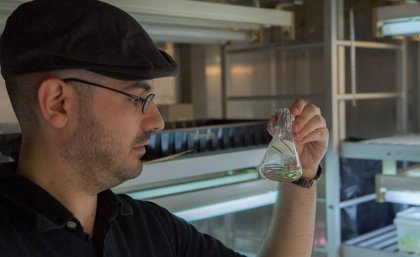
Advancing research in fields as diverse as manufacturing, human health, agriculture and the protection of ecosystems will be the aim of a $13 million investment by CSIRO in which The University of Queensland features heavily.
Three of 11 nationwide recipients of Future Science Fellows – Dr Konstantinos Vavitsas, Dr Karen Weynberg, and Dr Jason Whitfield – will be hosted at UQ as part of the CSIRO Synthetic Biology Future Science Platform (SynBio FSP).
Synthetic biology is a highly interdisciplinary science, drawing on biology, engineering, and computer science.
It involves the design and construction of biological systems and devices, as well as the re-design of existing, natural biological systems, often based on DNA-encoded componentry, and their application for useful purposes.
The UQ institutes and faculties housing the fellows - Australian Institute for Bioengineering and Nanotechnology, Institute for Molecular Bioscience, and the Faculty of Science – have provided funding to match the CSIRO contribution.
The projects they will contribute to are:
- Konstantinos Vavitsas (AIBN) – Fully exploring the potential of cyanobacteria for the renewable production of high-value chemicals by creating a modular, high-throughput genetic engineering toolbox.
- Jason Whitfield (IMB) – Developing methods enabling the creation of affordable, easy-to-use biosensors, capable of real-time biological monitoring. These could be used to detect important molecules inside cells (eg bacteria and yeast) or in bodily fluids (eg blood and saliva). These biosensors could be used in industrial settings such as biofuel development and agriculture, or eliminate the need for time-consuming and costly medical tests.
- Dr Karen Weynberg (Science) – Use of synthetic biology to target and control biofilms in medical, food, water and biotechnology industries. Biofilms are sticky, sometimes antibiotic drug-resistant, communities of bacteria.
Leader of CSIRO’s SynBio FSP Associate Professor Claudia Vickers said the platform was built on a philosophy of responsible development of synthetic biology technology, striving for ethical outcomes and working within the bounds of social acceptance.
“Synthetic biology has significant potential for generating benefits for society and is set to drive innovation in a large number of diverse industries going into the future,” Dr Vickers said.
“The role of the FSP is to improve Australia’s capabilities in this field, and position us to understand, adapt and contribute to this innovation in a responsible way to maintain Australian competitiveness.
“These Fellowships will help grow the capability of a new generation of researchers and attract the best students and experts to work with us on future science in Australia.
“The mission is to develop capacity in synthetic biology within CSIRO and across Australia, in a collaborative and transparent manner.”
Media: UQ Communications, communications@uq.edu.au, +61 7 3365 3439.



